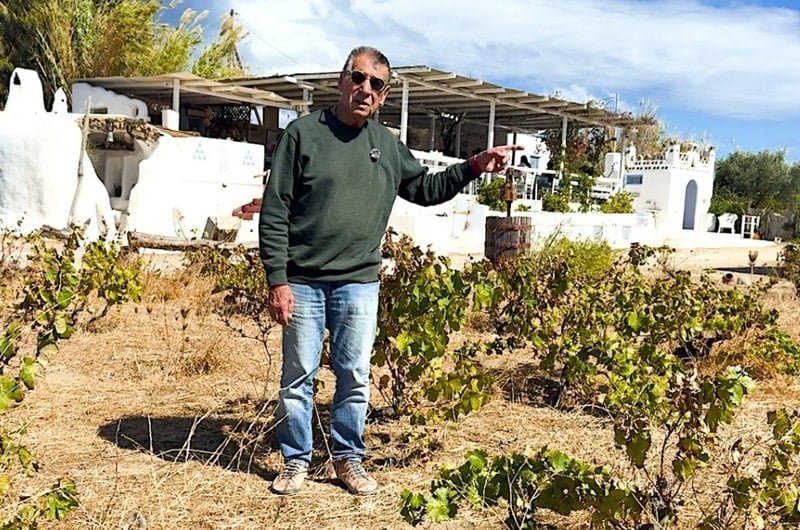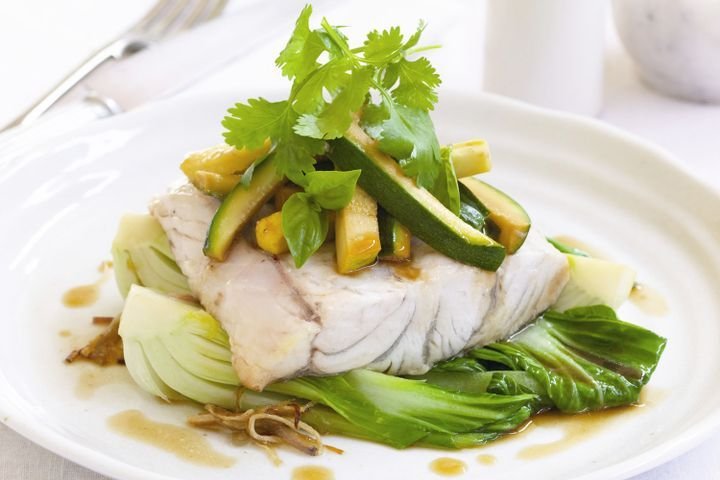
Nikos Asimomytis chose a unique method to aid his vineyard on arid Mykonos: he plays classical music, which he believes helps the vines produce tasty grapes and excellent wine.
“Speakers are scattered all over the vineyard, and the vines listen to classical music. This is not a figment of my imagination; many scientists have studied music in agriculture in general and have found good results. Combined with the biodynamic method I follow, it is another factor that justifies, or rather, necessitates the music, because the plants develop better,” Asimomytis stresses to Greek Reporter.
Asimomytis left the Bank of Greece through voluntary departure, closed the office he maintained in Athens, and quit teaching at the Technological Educational Institute (TEI). He then settled on his father’s island to create the wine, “Mykonos Vioma” (meaning “experience”). He started 32 years ago by renting land belonging to a monastery in Ano Mera, in the Maou area, and planted vines.

The whole vineyard listens to music
“We have about 20 speakers, so the whole vineyard listens to music. It helps the vines. We see it in practice,” he notes. “We always play classical music because we believe it helps the vines best. The music plays every day, winter and summer.”
The vineyard was rejuvenated by planting traditional Aegean-sea varieties: Asyrtiko, Athiri, Monemvasia, Malagouzia, Agiannitis and Mandilaria.
The arrangement of the vines in the field is linear, with a distance of two meters between the vine roots and among the cultivating rows. The yield is small, just 3500 kg/hectare; the two basic reasons are that the plants are kept low due to the strong winds and because they are not irrigated, therefore finding moisture in the atmosphere, mostly carried by the sea breeze, and in the soil through their roots.
“During harvest time, the vineyard gives us great joy. It listens to music, which, we could say, without being able to prove it, transfers to the grape. That’s why everyone praises our wines despite the fact that in Mykonos we don’t have much water, the soil is rocky, and it’s very windy. They ask us, ‘How do you produce such beautiful wine?’ I believe that classical music helps a lot.”

The tough, arid soil, although it results in a small yield per acre, enhances the grapes’ sugars and robustness, and prevents vine diseases, clearly contributing to the quality of the fruit and, consequently, the wine. Furthermore, the sea breeze moisturizes the land, revitalizes the vines, and imparts a salty character, mainly to the white wine.
For more on this topic, he suggests the book The Secret Life of Plants by Peter Tompkins and Christopher Bird.
“Scientific measurements have been taken on plants grown with and without music, revealing their qualitative and quantitative difference. The impression I’ve gathered from all these years of viticulture is consistent with these scientific findings. Moreover, we who work and live together (people and animals) in this space also feel and work more pleasantly thanks to the classical music.”
The “Mykonos Vioma” vineyard and farm

They produce four wines: the white and red dry “Paraportiano,” the rosé “Veggera me Rosé,” and their sweet sun-dried wine “Heliophilos” (meaning “sun-lover”).
The dry Aegean varieties they cultivate are Assyrtiko and Athiri for the white, Mandilaria and Agiannitis for the red, Mandilaria for the rosé, and Malagouzia for the sun-dried wine.
His favorite is clearly the Heliophilos, as it is the traditional Mykonian wine, produced from grapes sun-dried for 7-10 days and pressed in their traditional wine press, reviving the custom of foot-treading.
The Asimomytis’ farm is also home to 15 beehives producing pure honey. Other members of the farm family are the dogs, cats, goats, chickens, turkeys, and the celebrity Marika the donkey.
In the garden, the farm grows organic seasonal vegetables and Mediterranean herbs. At the traditional wood-oven, it is baking bread and food for the family in the old-fashioned way.
Related: Greece Among Top European Destinations for Wine Tourism


